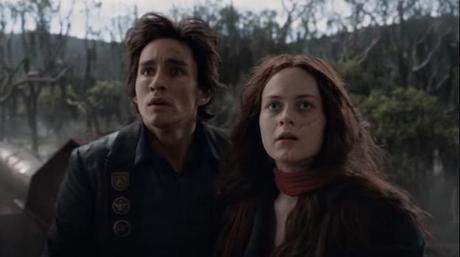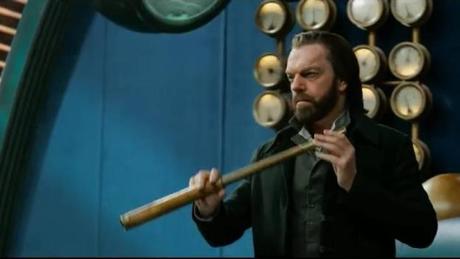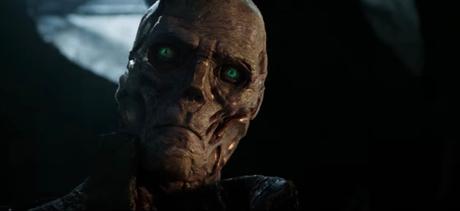We keep saying we want Hollywood to get better and pull back on all the reboots, revival, sequels, and general retelling of old stories. Why not try to tell new stories and start new franchises, dammit? Yet, when Hollywood goes down this route it often gets punished at the box office and by the critics.
Well, here we are with something new, or at least newish. Peter Jackson and pals have adapted a rather bonkers-sounding sci-fi novel series into what they hope will be a new film franchise:

A thousand years after a global catastrophe, the world has rolled back centuries of technological and cultural progress and returned to strict caste systems and steam-powered engines. Cities now exist as mobilized, mechanized entities in direct competition with other cities for the planet's dwindling resources, forcing them to hunt one another like glorified pirate ships. As new London plots an assault on the walled-off lands of Asia, which is an untouched paradise since its people refused to join the new mobilized city movement, a would-be assassin with a grudge (Icelandic actress and total revelation Hera Hilmar) and a historian (a likable Robert Sheehan) who initially gets in her way are set off on adventure together, one which will take them across the world and land them right in the heart of a rebellion.

As the film's director, longtime Jackson apprentice Christian Rivers, put it, "We sort of have the scale [ and soap opera] of Star Wars, the gritty realism of Mad Max, and inherent in Philips' writing, there is this Harry Potter-esque, English, institutional, almost Dickensian feel."
There is, despite their better efforts, also an unmistakable, slight hint of YA dystopia, with a young heroine taking on a corrupt world run by adults (mostly symbolized here in the form of Hugo Weaving's scheming evil villain) and falling in love in the process. Or maybe I just see the comparisons since Hilmar looks quite a bit like The Maze Runner's Kaya Scodelario. "Where the press is getting very confused is that we are not one of those films for the teenage market," Rivers told Total Film. "This is not The Hunger Games or the Divergent series, or Maze Runner."
But, if not the teenage market then who is this movie for? Everyone, they hope, but that's not a message Universal's marketing department has been able to nail down. As a result, Rivers probably won't be directing a sequel for Jackson anytime soon. The Mortal Engines, which cost at least $100m to make, is bombing around the world, landing as a complete dud with critics ( 28% RT) and only so-so effort for fans ( 2.8 out of 5 starts on Letterboxd, 6.5/10 on IMDB). However, as IndieWire's David Ehrlich put it, " Mortal Engines might not be a particularly good movie, but it's a BIG one, and sometimes that can be even more important."

Yes, this is pure cinematic spectacle, and while it occasionally veers into the bad kind of spectacle, like watching a slow-motion trainwreck, there's usually a new, better plot point around the corner or genuinely stunning action sequence on the way. Just when you start to mentally check out, for example, Stephen Lang's mo-capped half-robot/half-dead man character Shrike pops up and intrigues as an unstoppable Terminator with a heart of gold and faint human memories. It's a deeply strange plot turn, but damn if it doesn't hold your attention.

Still, I spent much of The Mortal Engines' opening feeling like Peter Jackson, who originally wanted to direct this instead of The Hobbit back in 2012 and then only let Rivers direct after The Hobbit trilogy zapped him of all his energy, had clearly missed the steampunk window by half a decade. As a producer, co-screenwriter, and second unit director, he's given the world a sci-fi Victorian England long after the world lost interest in such a concept. Plus, even though I ended up enjoying this deeply weird piece of popcorn cinema I'm never going to be convinced that The Mortal Engines ' motorized, mobile giant cities roaming the world and consuming one another in a city eat city form of capitalism is a good premise for a movie.
Nor do I think adapting a story like that, which originated in sci-fi author Philip Reeve's quartet of novels, into a big budget movie instead of an expensive TV mini-series is even the best idea. Reeve's novels are loaded with elaborate backstory, exposition, character, intrigue, and, yes, old-fashioned adventure. Maybe, as the Russo Brothers recently argued in a more general sense, the two-hour movie format isn't the most ideal platform for that kind of storytelling anymore.
But, really, how the heck do you pull off giant, steampunk cities fighting one another on a TV budget? Plus, whenever Jackson and his old Lord of the Rings/ The Hobbit collaborators want to offer up the type of big-screen spectacle no one else would dare attempt we're obliged to at least see what they have to offer.
What's on offer here is a lot of money and time thrown behind some pretty far out ideas. Not only that, it ends up playing as outright hostile toward western civilization, with the conflict ultimately boiling down to lily white Londoners, their ugly technology and their belligerent refusal to learn anything from history against a diverse rainbow of far more enlightened, mostly non-white peoples.
When, at a climactic moment, an Asian leader is seen extending his hand out in peace and offering entryway to paradise ala The Grapes of Wrath's FDR stand-in saving Dust Bowl migrants with his New Deal, you'd swear this must be one of those secret China-funded movies like Pacific Rim: Uprising. It's not, at least as far as I can tell. Peter Jackson, Fran Walsh, and Philippa Boyens, partnering with Universal and US-based film financier Media Rights Capital, took Reeve's first book, supercharged it on steroids, and churned out a screenplay which is deliberately unsubtle in its messaging and deeply cynical about what westerners are doing to the world. They even include a quick condemnation of the Trump administration's child separation policy.
Whether audiences will notice or care about any of the commentary comes down to people actually paying to see the movie. Right now, hardly anyone is doing that, and The Mortal Engines appears to be headed to the same cinematic graveyard of big-budget, would-be sci-fi franchises like Valerian and the City of a Thousand Planets. However, I'm glad I saw The Mortal Engines. As the other guy said, it is by no means a perfect movie, but it's an awfully big one, in every way imaginable.
THE BOTTOM LINEJust strange enough to be enjoyable, but a tad too strange to be totally engrossing.
RANDOM PARTING THOUGHTS
- Heads up, The Expanse fans! New Zealand actress Frankie Adams, who plays the badass space marine Bobby on The Expanse, pops up in the final third of Mortal Engines as a resistance fighter aligned with Jihae's character.
- Backstory time: The reason London is shown to have reverted to its Victorian ways is that in his original writing of the first novel Philip Reeve conceived as The Mortal Engines as an alt-history story actually set in the early 1900s. This proved too unruly a premise as it required far too much explanation for how the timelines diverged. So, he just set it in the far future.

Grew up obsessing over movies and TV shows. Worked in a video store. Minored in film at college because my college didn't offer a film major. Worked in academia for a while. Have been freelance writing and running this blog since 2013. View all posts by Kelly Konda

